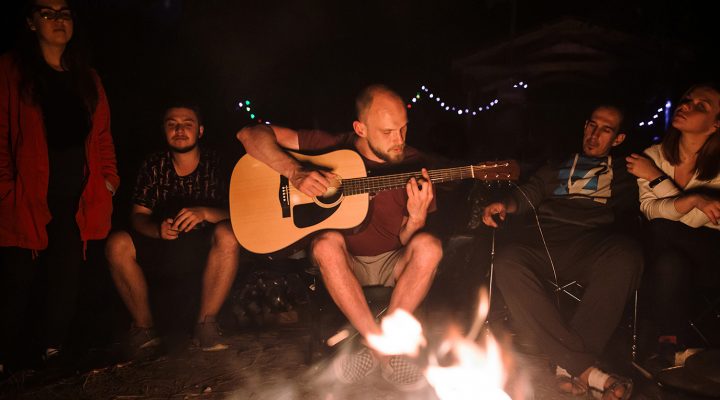We are one in the Spirit, we are one in the Lord.
We are one in the Spirit, we are one in the Lord.
And we pray that our unity will one day be restored.
And they’ll know we are Christians by our love, by our love.
Yeah they’ll know we are Christians by our love.
Once called “the anthem of the Jesus Movement,” that song was written in the post-Vatican II era (1960s) by Peter Scholtes, a Catholic priest at St. Brendan’s Church on Chicago’s South Side.
Director of an interracial youth choir, he could not find an appropriate hymn that responded to the ecumenical Civil Rights hopes of the times, so he wrote this one. Based on Jesus’ words in John 13:35, “By this everyone will know that you are my disciples, if you have love for one another,” it celebrated Christian unity grounded in God’s redemptive love amid a time of social and political unrest.
That was then; this is now.

Bill Leonard
At this moment in our religio-cultural life, social, political and religious upheaval continues, with an intensity clearly evident in American Christianity. Given that abiding turmoil, it is time to ask: “Yeah, they’ll know we are Christians by our WHAT?”
What are the implicit and explicit signs of a Christian “witness” that seems a long, long way from the love “shed abroad” by Jesus. While God’s love remains a continuing spiritual ideal, divisions within the body of Christ seem symptomatic of fissures in the social and political fabric of the nation. Even words we’ve used to describe our approach to the gospel seem increasingly problematic. “Evangelical” is a case in point.
In an October 2021 Atlantic article titled “The Evangelical Church Is Breaking Apart,” and subtitled, “Christians Must Reclaim Jesus from His Church,” journalist, professor and self-acknowledged evangelical Peter Wehner wrote:
The aggressive, disruptive and unforgiving mindset that characterizes so much of our politics has found a home in many American churches. The root of the discord lies in the fact that many Christians have embraced the worst aspects of our culture and our politics. When the Christian faith is politicized, churches become repositories not of grace but of grievances, places where tribal identities are reinforced, where fears are nurtured and where aggression and nastiness are sacralized. The result is not only wounding the nation; it’s having a devastating impact on the Christian faith.
Wehner cited numerous evangelical scholars with similar concerns. James Ernest, editor in chief at Eerdmans Publishing Co., told him, “The evangelical Church in the U.S. over the last five decades has failed to form its adherents into disciples. So there is a great hollowness. All that was needed to cause the implosion that we have seen was a sufficiently provocative stimulus. And that stimulus came.”
“How will people inside and outside Christ’s church know who Christians are or claim to be?”
The stark assessments of these (and other) evangelical leaders compel us to ask: After five decades of failure to form evangelical “adherents into disciples,” how will people inside and outside Christ’s church know who Christians are or claim to be? Dare we sing, “Yeah they’ll know we are Christians by our great hollowness?”
Wehner’s prophetic, troubling commentary forces us to ask: Is our witness to God’s love so broken as to require reclaiming Jesus from his church? In the popular mind, has the word “evangelical” become more aligned with a political ideology of “fake news,” “alternative facts” and “open carry” than the “good news” of God’s love incarnated in Jesus of Nazareth?
Kristin Kobes Du Mez, author of the blockbuster book Jesus and John Wayne, told Wehner: “Evangelicals are quick to label their values ‘biblical,’ but how they interpret the Scriptures, which parts they decide to emphasize and which parts they decide to ignore, all this is informed by their historical and cultural circumstances.”
While such practices apply to the entire Christian community, “conservative evangelicals insist that they are rejecting cultural influences, when in fact their faith is profoundly shaped by cultural and political values, by their racial identity and their Christian nationalism.”
In 2023, it is not just that “evangelical” has become associated with “another gospel,” as Saint Paul called that of the “super apostles” who came to Corinth (2 Corinthians 11:1-6). Even the word “Christian” appears under revisionist threat. In the public square, how many Americans now equate “Christian” with “nationalism,” worse yet, “white Christian nationalism?”
“In the public square, how many Americans now equate ‘Christian’ with ‘nationalism’?”
Are some among us singing, “Yeah they’ll know we are Christians by our Christian nationalism?”
Amanda Tyler, executive director of Baptist Joint Committee, has led that historic organization in refuting such claims. She recently reported her attendance at a ReAwaken America tour at the Trump Doral resort in Miami. ReAwaken America events are Christian nationalist conferences led by such former presidential advisers as Mike Flynn and Roger Stone.
Tyler’s observations include:
There were a lot of people. … We should not take these tour events lightly. There were people of all ages, including small children. Younger, college-aged students were working registration. They are organizing and creating communities at these events.
For many there, it seemed like a genuinely religious experience. I’m often asked how religious I believe this movement is, and I often answer that it is a political movement using religion for its authority, motivation and permission structure.
Baptisms — one thing I really wanted to see for myself. These were odd baptisms to me, because it was not at all clear to me what they were being baptized into. Each one took less than a minute, the person would step into a plastic kiddie pool, sit down and tell three people his or her name, and then be dunked. The officiants didn’t even say anything like a liturgy when doing it. … Again, for the person doing it, it did seem like a genuinely spiritual experience, but of what, I don’t know. It wasn’t a recognizable Christian baptism to me.
Calls for political violence were bolder than I expected. Speakers talked about “spiritual warfare,” that we weren’t meant to be sheep but lions for Jesus. Greg Locke in an incredibly fiery “sermon” talked about the need to use our Second Amendment rights if the government won’t respect our First Amendment rights (huge applause line; people jumped to their feet and pumped their fist).
Tyler concludes by asserting BJC’s commitment to opposing Christian nationalism and offers options for others who want to join that endeavor.
Regarding religio-political violence, Newsweek recently reported on an April 23 sermon by Jason Graber, pastor of Sure Foundation (Independent Fundamentalist) Baptist Church in Spokane, who told his congregation: “Any parents that would have their child have a transgender surgery done on them. Any parent that would do that should be shot in the back of the head. They need to be convicted in trial and immediately shot in the back of the head, and then we can string them up above a bridge so the public can see the consequences of that kind of wickedness.” Graber also called for the execution of LGBTQ people as a biblical mandate.
Such rhetoric, delivered from a supposedly Christian pulpit, is a despicable and cruel aberration. Yet Newsweek reported it received 2 million viewers in three days. In this already volatile, firearm-obsessed society, who among them might sense a divine directive to act? Would they sing: “Yeah they’ll know we are Christians by who we execute?”
Is it indeed time, in Wehner’s words, “to reclaim Jesus from his church.” Haunted by that idea, I find myself clinging to the amazingly inclusive gospel that fell on the church at the first Pentecost. Peter said it:
God declares, that I will pour out my Spirit upon all flesh, and your sons and your daughters shall prophesy, and your young men shall see visions, and your old men shall dream dreams. Even upon my slaves, both men and women, in those days I will pour out my Spirit, and they shall prophesy. (Acts 2:17-18)
As one of those gospel-impacted “old men,” I’m dreaming the Spirit will help us reclaim Jesus and his church with a new, redemptive presence and without the aid or interference of state legislatures, Congress or the Supreme Court.
Then perhaps we can still sing:
We will work with each other, we will work side by side.
We will work with each other, we will work side by side.
And we’ll guard each one’s dignity and save each one’s pride.
And they’ll know we are Christians by our love, by our love.
Yeah, they’ll know we are Christians by our love.
God help us do that, while there is still time.
Bill Leonard is founding dean and the James and Marilyn Dunn professor of Baptist studies and church history emeritus at Wake Forest University School of Divinity in Winston-Salem, N.C. He is the author or editor of 25 books. A native Texan, he lives in Winston-Salem with his wife, Candyce, and their daughter, Stephanie.


